Backpacking is an exhilarating outdoor adventure that offers a unique way to explore the beauty of nature. We have a backpacking advice for beginners.
Whether you’re a novice hiker or an experienced adventurer, this blog post will provide you with essential tips and guidance to embark on your backpacking journey. Here are ten pieces of advice for backpacking:
- Plan and Prepare: Research your destination thoroughly, create an itinerary, and make sure you have all the necessary permits, maps, and gear before setting out.
- Pack Light: Only bring the essentials. A heavy backpack can quickly lead to fatigue and discomfort. Prioritize lightweight, compact gear.
- Quality Backpack: Invest in a comfortable, well-fitting backpack. Make sure it has adjustable straps and fits your body properly.
- Layer Clothing: Pack clothing in layers to adapt to changing weather. Moisture-wicking base layers, insulating mid-layers, and a waterproof outer layer are essential.
- Proper Footwear: Choose comfortable, durable hiking boots or trail shoes that are broken in before your trip. Good socks are equally important.
- Water and Food: Carry enough water and food for your journey. Invest in a reliable water filtration system, and bring calorie-dense, non-perishable foods.
- Leave No Trace: Follow Leave No Trace principles to minimize your impact on the environment. Dispose of waste properly, respect wildlife, and stay on designated trails.
- Navigation Skills: Learn how to use a map and compass or a GPS device. It’s essential to have a backup navigation method in case technology fails.
- Safety Gear: Pack a first-aid kit, a whistle, a headlamp, and a multi-tool. Ensure you have a way to signal for help in emergencies.
- Trail Etiquette: Be courteous to fellow hikers. Yield the trail to those going uphill, keep noise levels down, and respect the serenity of nature.
Contents
Discover popular destinations for beginner backpackers, learn about the importance of proper planning and preparation.
And find out how to make the most of your backpacking experience.
From choosing the right gear, selecting backpacking trails, to backcountry camping and hiking partners, this comprehensive guide has got you covered.
Get ready to embrace the wilderness and create unforgettable memories!
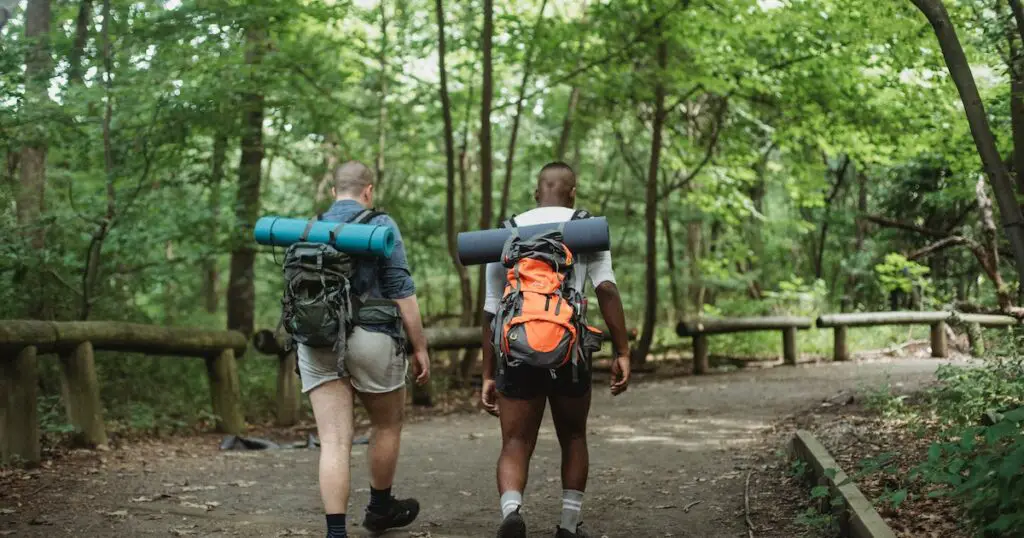
Backpacking Advice for Beginners
To have a successful backpacking trip, it’s crucial to research and select trails that match your skill level.
Look for trails with moderate difficulty ratings or beginner-friendly options. This will help ensure you don’t end up on a trail that is too challenging for your abilities.
Start with Shorter Trips
Building endurance and confidence is key when starting out as a backpacker.
Begin by embarking on shorter trips to get used to carrying a pack and hiking for extended periods.
Gradually increase the length of your trips as you become more comfortable and confident in your abilities.
Pack Light and Prioritize Essentials
When packing for a backpacking trip, it’s essential to keep weight in mind. Pack only the necessary items to avoid unnecessary strain on your body.
Prioritize essentials such as a sturdy backpack, sleeping pad, camp pillow, appropriate clothing, food, water, and navigation tools.
Learn Basic Navigation Skills
Navigating the wilderness is an important skill for any backpacker. Familiarize yourself with basic navigation techniques using a map and compass.
Understanding how to read maps, identify landmarks, and follow trail markers will help you stay on track during your backpacking adventures.
Remember that these are just some general tips for beginners getting into backpacking.
As you gain experience, you’ll learn what works best for you personally. Happy hiking!
Essential Backpacking Skills
Setting up a tent and campsite efficiently is an essential skill for beginner backpackers.
It’s important to choose a suitable location for your tent, away from hazards like falling branches or uneven ground.
Make sure to follow the instructions provided with your tent and practice setting it up before you head out into the wilderness.
Filtering water from natural sources safely
When backpacking in remote areas, finding clean drinking water is crucial.
Learning how to filter water from natural sources safely will ensure you stay hydrated without getting sick.
Invest in a reliable water filtration system or bring along purification tablets to treat the water before consuming it.
Remember, never drink untreated water directly from streams or lakes as it may contain harmful bacteria or parasites.
Building a fire responsibly in designated areas
Building a fire can provide warmth and cook food while backpacking, but it’s important to do so responsibly.
Only build fires in designated areas where they are permitted and always follow local regulations.
Make sure to gather dry wood and kindling before starting the fire and keep it small to minimize the risk of spreading.
Always fully extinguish the fire before leaving by pouring water over the ashes.
Understanding basic first aid techniques for common injuries
Accidents can happen while backpacking, so having knowledge of basic first aid techniques is essential.
Learn how to treat common injuries like cuts, burns, sprains, and blisters.
Carry a well-stocked first aid kit that includes bandages, antiseptic wipes, pain relievers, and any necessary prescription medication.
By mastering these essential backpacking skills – setting up your campsite efficiently, filtering water safely, building responsible fires.
And understanding basic first aid techniques – you’ll be well-prepared for your outdoor adventures.
Remember to always check with local outdoor stores or ranger stations for additional advice specific to your destination.
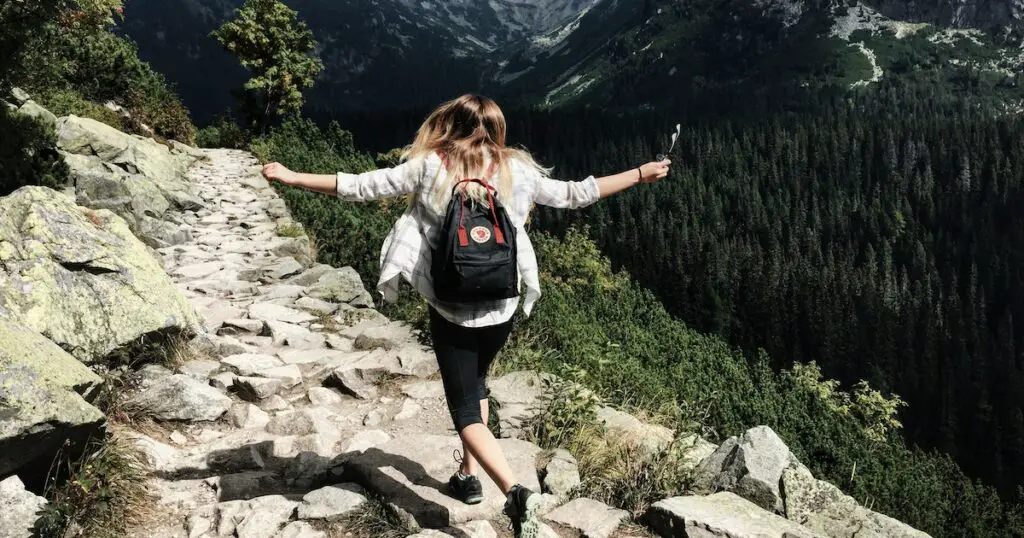
Beginner Backpacking Tips for a Successful Trip
When you’re out on a hike, it’s important to pace yourself. Don’t rush! Take it slow and steady to avoid getting exhausted too quickly.
This way, you’ll have more energy to enjoy the beautiful scenery along the way.
Stay Hydrated Throughout the Day
Drinking water regularly is key to staying hydrated during your backpacking trip. Make sure to bring enough water with you and sip on it throughout the day.
Staying hydrated will keep you energized and help prevent any potential health issues.
Take Breaks to Rest and Refuel
Remember, backpacking is not a race! It’s important to take breaks along the trail.
Use these breaks as an opportunity to rest, refuel with some snacks or dehydrated meals, and appreciate the breathtaking views around you.
Taking breaks will also give your body a chance to recharge before continuing your adventure.
Be Mindful of Wildlife Encounters
While exploring nature, it’s essential to be aware of wildlife encounters. Follow guidelines for safety and respect their habitat.
Keep a safe distance from animals, never feed them, and always dispose of trash properly.
By being mindful of wildlife, you can ensure both your safety and theirs.
Remember these insider tips when planning your next backpacking trip:
- Research the area beforehand for any specific tips or regulations.
- Check weather forecasts so that you can pack accordingly for cold or bad weather conditions.
- Create a detailed trip plan including your intended route, campsites, and emergency contacts.
- Pack lightweight gear that won’t weigh you down but still keeps you prepared for various situations.
- Start with shorter trips before attempting longer ones to build up endurance gradually.
By following these beginner backpacking tips, you’ll set yourself up for a great experience in the great outdoors! So go ahead, embrace nature’s beauty and embark on an unforgettable backpacking adventure!
Must-Have Gear Recommendations
Quality Backpack
A good backpack is essential for any beginner backpacker. Look for one that fits comfortably on your back and has enough room to carry all your gear.
Make sure it has adjustable straps and a padded hip belt for added support.
Lightweight Sleeping Bag
Invest in a lightweight sleeping bag that suits the expected weather conditions. You don’t want to be lugging around a heavy, bulky bag on your trip.
Look for one that provides enough insulation without adding unnecessary weight to your pack.
Durable Hiking Boots
Having a pair of durable hiking boots with good ankle support is crucial when you’re out on the trails.
They will protect your feet from rocks, uneven terrain, and provide stability during long hikes. Make sure they fit well and are comfortable to wear.
Portable Camping Stove
A portable camping stove is a must-have item for cooking meals while backpacking. Look for one that is lightweight, compact, and easy to use.
It should be able to boil water quickly and have adjustable heat settings.
Remember, these are just some gear recommendations for beginners starting their backpacking journey.
You may also want to consider other items such as a rain jacket, running shoes for campsite exploration, or even a communication device like a satellite phone or GPS tracker for added safety.
Keep in mind that gear preferences can vary depending on personal needs and preferences.
Always do thorough research before purchasing any equipment and read reviews from experienced backpackers who have used the items you’re considering.
Now that we’ve covered some essential gear recommendations, you’ll be better prepared for your first backpacking adventure!
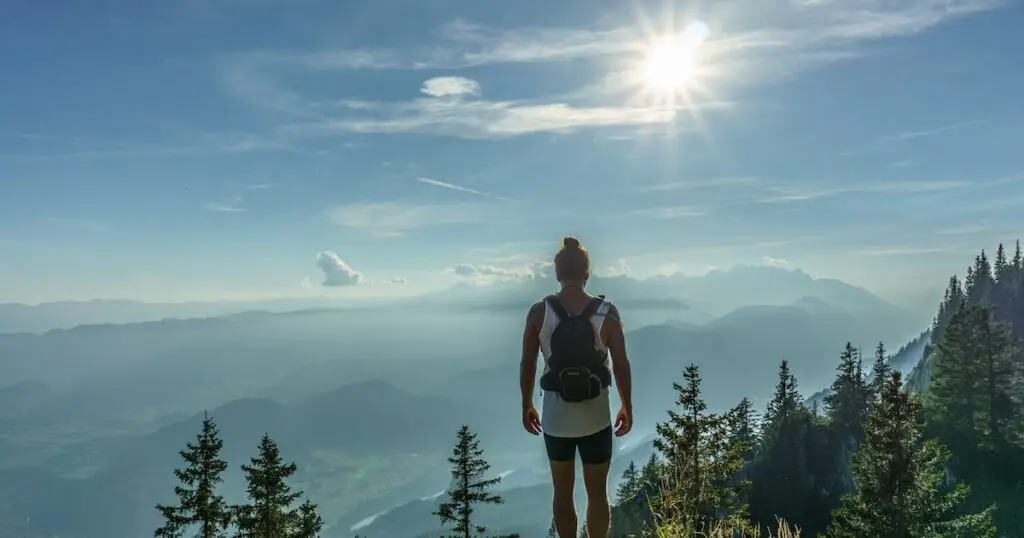
Leave No Trace Principles and Hygiene Tips
To ensure that you leave nature as pristine as you found it, there are a few essential principles to follow.
Let’s dive into some tips on practicing Leave No Trace and maintaining proper hygiene while backpacking.
Practice proper waste disposal by packing out all trash
When you’re out in the wilderness, it’s crucial to take responsibility for your waste.
Make sure to pack out all your trash, including food wrappers, plastic bottles, and any other garbage.
Leaving trash behind can harm wildlife and disrupt the natural environment.
Minimize impact on nature by staying on designated trails
One of the best ways to preserve nature is by staying on designated trails. Straying off the path can trample delicate vegetation and disturb wildlife habitats.
So stick to the trail like glue and enjoy the beauty of nature while treading lightly.
Use biodegradable soap when washing dishes or bathing outdoors
Maintaining personal hygiene is important even when you’re roughing it in the great outdoors.
When washing dishes or bathing outside, use biodegradable soap that won’t harm plants or animals if it gets into water sources.
This way, you can stay clean without leaving a trace.
Carry hand sanitizer or wet wipes to maintain hygiene
In addition to using biodegradable soap, it’s also wise to carry hand sanitizer or wet wipes with you.
These come in handy when access to water is limited, ensuring that you can keep your hands clean and germ-free.
By following these Leave No Trace principles and practicing good hygiene habits while backpacking.
You’ll be able to enjoy nature while minimizing your impact on the environment. Remember: leave only footprints, take only memories!
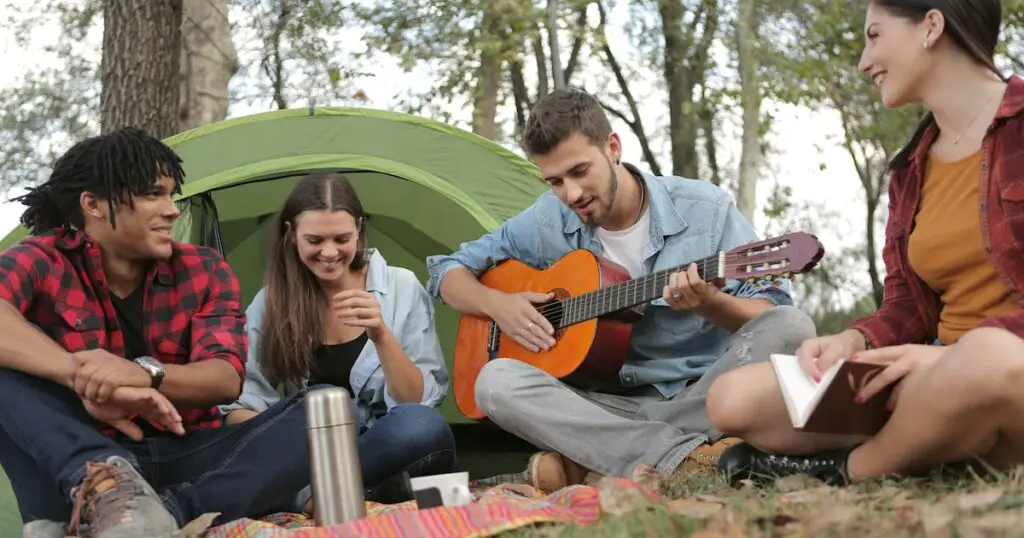
Planning and Preparation Steps for Beginners
Before embarking on your backpacking adventure, it’s crucial to do some research about the area you’ll be exploring.
Check for any local regulations, permits, or restrictions that may apply. This will help you avoid any legal issues or unexpected surprises along the way.
Create a detailed itinerary including daily mileage goals
To stay organized during your backpacking trip, it’s essential to create a detailed itinerary. Plan out each day’s route and set achievable daily mileage goals.
This will give you a clear sense of direction and help you stay on track throughout your journey.
Check weather forecasts prior to departure
Checking the weather forecast before setting off is an important step in ensuring a safe and comfortable backpacking experience.
Knowing what kind of weather conditions to expect can help you pack appropriately and make any necessary adjustments to your plans.
Inform someone about your trip plans, including expected return date
Safety should always be a top priority when venturing into the wilderness.
Before heading out on your backpacking trip, make sure to inform someone trustworthy about your plans.
Share details such as your intended route, expected return date, and emergency contact information.
In case something goes wrong or if you encounter any difficulties along the way, this person will know where to find you or who to contact for assistance.
By following these planning and preparation steps as a beginner backpacker, you’ll be well-equipped with the knowledge needed for a successful adventure in the great outdoors.
Final Thoughts
In conclusion, this blog post has provided valuable advice for beginners looking to embark on a backpacking adventure.
By following the essential backpacking skills, tips for a successful trip, gear recommendations, leave no trace principles.
And planning and preparation steps outlined in the previous sections, beginners can feel confident and prepared for their first backpacking experience.
To ensure a safe and enjoyable journey, it is important to remember that backpacking requires careful planning and attention to detail.
Research the trail you plan to hike, pack appropriate gear based on the weather conditions and duration of your trip.
And familiarize yourself with leave no trace principles to minimize your impact on the environment.
Always prioritize safety by informing someone of your itinerary and carrying necessary emergency supplies.
FAQs
1. What type of backpack should I use for beginner backpacking?
When choosing a backpack for beginner backpacking, opt for one that fits comfortably on your back and has enough capacity to hold all your essential gear.
2. Are there any specific clothing items I should pack for my first backpacking trip?
It is crucial to pack appropriate clothing based on the weather conditions you expect during your trip. Layered clothing is recommended as it allows you to adjust according to temperature changes.
3. How do I choose a suitable campsite while backpacking?
When selecting a campsite while backpacking, consider factors such as proximity to water sources (for drinking/cooking), level ground suitable for pitching tents or setting up hammocks safely away from hazards like dead trees or rockfall, and adherence to any local regulations or restrictions.
4. What food should I bring for backpacking trips?
Opt for lightweight, non-perishable foods that provide sufficient energy for your hiking adventures. Consider options such as dehydrated meals, trail mix, energy bars, nuts, dried fruits, and instant coffee or tea.
5. How can I stay safe from wildlife encounters while backpacking?
To minimize the risk of wildlife encounters while backpacking, it is essential to properly store your food away from your sleeping area in bear-resistant containers or by hanging it from a tree branch (following specific guidelines).

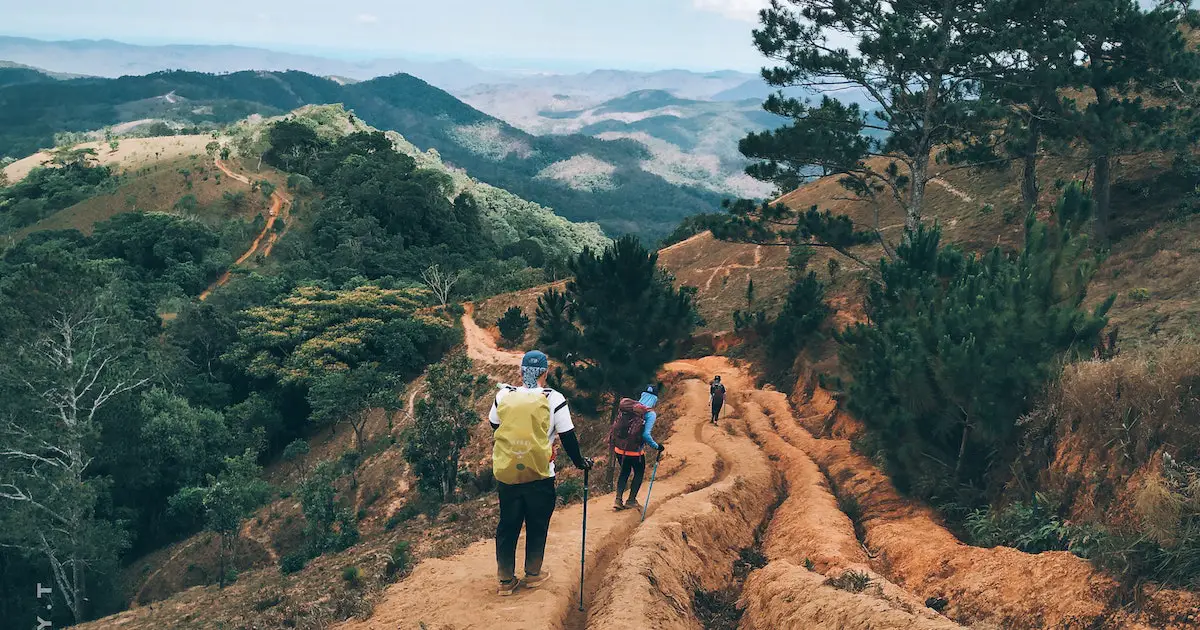

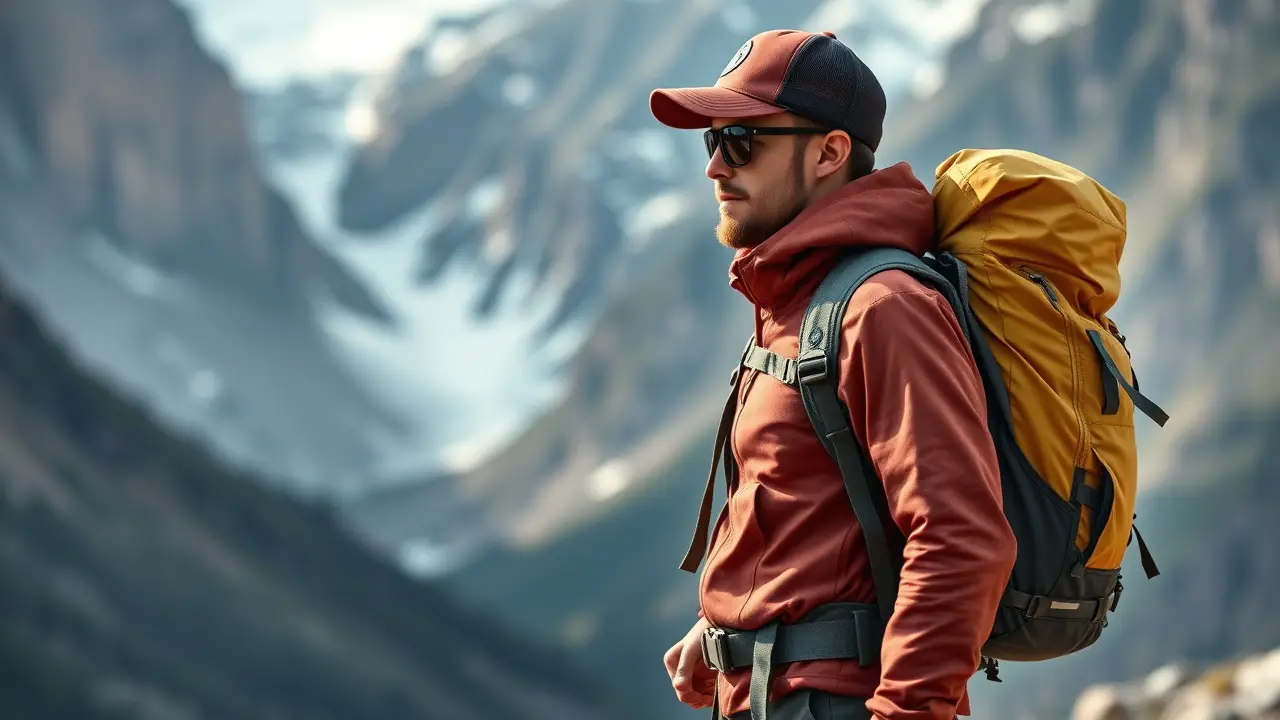
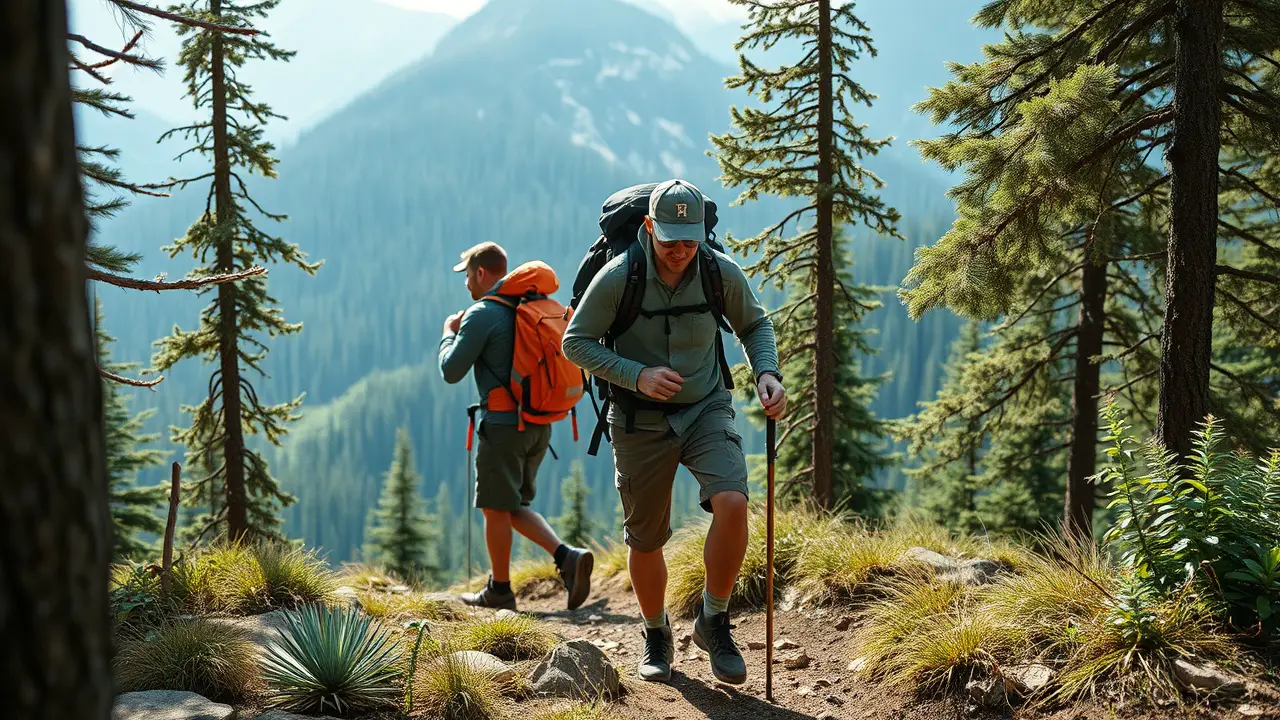
Leave a Reply